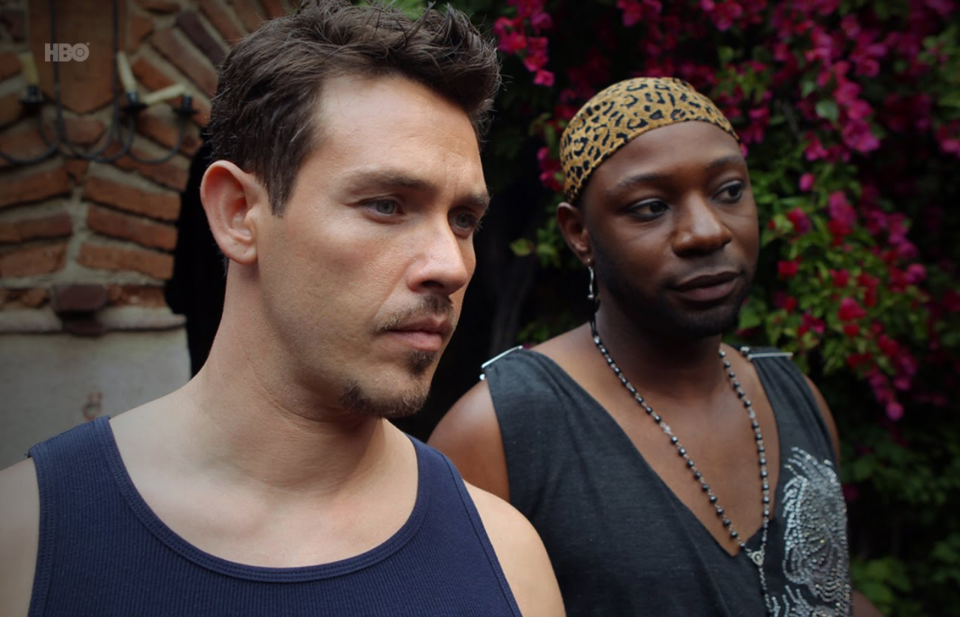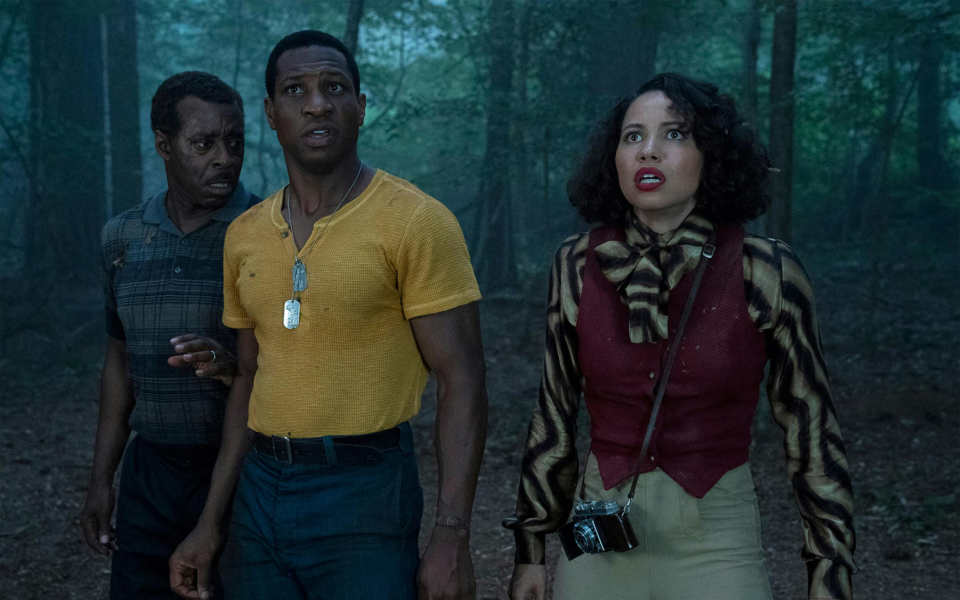Men & Magic: An Antidote for Toxic Patriarchy In Horror

Sitting across from Steven Broadnax III on his set, hours before the half-hour curtain call for a Saturday matinee at People’s Light Theater in Malvern, PA, I asked him about his research for his new horror play Bonez. We were recording the interview for my horror podcast, Black Women Are Scary, which celebrates BIPOC authors writing horror. During our conversation, we went down a rabbit hole about commonalities between spiritual practices on the continent of Africa (he went to several countries) and the Black church in the U.S. Steven noted one significant difference: men lead ritual practice in church but in Africa, they participate.
“So they surrender?” I asked him.
“Yeah,” he responded. “But here only the women do that. You know, only women catch the spirit, speak in tongues, and all that.”
A light went on, “They can’t surrender. Maybe that’s what makes masculinity toxic instead of divine because there can be no surrender. You need that to participate in ritual or to connect with the divine, because you can’t be in charge.”
We were excited after coming to this realization together, as though we had found a cure. Which would be on brand for Steven, playwright of a horror play about four Black men who summon toxic masculinity and vanquish it. Yes, you read that right. Toxic masculinity is a demon and it must be destroyed through culture, comedy, and conjuring. The characters have brutally honest, yet loving, conversations about things their fathers and mothers told them, expectations their sisters, girlfriends, and baby mamas have, and how it all feels impossible, even hurtful.
I’m not gonna sit here and talk about how being a man is hard, but I am going to point out that it makes no sense. Being Black in America is a singular experience that demonizes surrender through consistent acts of violence, coercion, oppression, know-your-place-aggressions, gaslighting, seduction, and distraction. The result is a never-ending state of dread that you become only dimly aware of, like an air conditioner that’s on all the time and you don’t hear it until it turns off for a moment.
This is why the horror genre pairs nicely with the Black experience and unpacking complicated realities around our lived experience. It allows for us to wax poetic about the joy, humor, death, and macabre beauty that ebbs and flows in our daily lives. Yet, even in this fiction, we have a hard time marrying men and magic. It’s as though the idea is so taboo even our imagination censors us. Typically, if a man practices magic he is a villain, or the magic makes him evil. The collective consciousness agrees that men cannot handle magic. They will inevitably misuse it and become dangerous, or it will simply get them killed. Men cannot survive magic let alone thrive in it.
The Magical Love Between Lafayette and Jesus In True Blood
Some recent examples of this you’ll find in True Blood with the dynamic between Lafayette and his boyfriend Jesus. In its earlier seasons, Lafayette sits on a razor-thin edge of feminine and masculine. One could argue he is an early rendition of a nonbinary character. He is a Black man, capital B, and unapologetically who he is which added a groundedness to a show that would move from Earthly plains to fairy dimensions. With the introduction of his love interest, Jesus, the show was able to explore medium work through Southern Black traditions as well as Brujeria from Mexico.

Though they never named it, I recognized Lafayette as a Root Worker in the Hoodoo spirituality practiced by Black Americans south of the Mason-Dixon line still to this day. Their romance represented an alliance between these two spiritual practices from men who were both powerful wielders of their magic as well as vessels that could be overtaken. Together, they explored surrender and mastery with drugs (vampire blood) and love. Then Jesus was killed and the tone of Lafayette’s character changed completely.
In later seasons Lafayette’s prowess as a medium grows and his representation becomes increasingly femme. Jesus’s absence is felt and Lafayette’s character suffers, becoming less complicated, less sensual. He has less dialogue and less screen time. He is dressed in shawls, headwraps, and turbans, with the lashes always on, helping the white folks connect with their spirits and resolve their problems. Lafayette is simplified to the problematic ‘mammy’ archetype and I think this says everything about what we were ready for as an audience during that time. We were not ready for a magical Black and Brown man loving each other and tapping into their ancestral power to undo great evils.
Atticus and His Legacy In Lovecraft Country
Take two happens with Atticus in Lovecraft Country. Again we have a Black man coming from a legacy of magical men, albeit racist and scary. As he delves further and further into his birthright and gets closer to his magic, it puts him in mortal danger. I think the show does a great job of balancing the magic between the men and the women, honoring the participation of both, as well as representing a variety of magical practices from different cultures. But Atticus dies; it’s his destiny. Perhaps that would not have been so disappointing had we gotten a second season of the show. But I won’t open that can of worms.

His death taps into the real danger of Black men knowing themselves, their history, and reaching for legacy. Oppression can only thrive if people are cut off from their culture and by extension, their accompanying spiritual practices. Surrender must be replaced with hypervigilance to keep you exhausted. Racism needs for your imagination to be inaccessible to you so that you can never dream that things could be different and cynicism can take hold of you. So magical men must not survive.
Men Need Magic
This is a trope across the board. If we look at Sam in Supernatural, his ‘shining’ came at a steep price that involved him being possessed by Lucifer himself. Though the Winchester brothers used a combination of magic and practical solutions, Sam’s magical abilities steamed from evil, making him a man at odds with himself.
We see this trope again in the Insidious franchise, where our favorite horror daddy Patrick Wilson also has a medium ability that runs through the paternal line in his family. But these boys can’t get a hold of it and the strategy was to make them forget this part of themselves altogether. Though the last installment has its problems I found it fascinating that the premise was all about how that binding, that forgetting of themselves, broke the family. The men couldn’t hold it together without being in touch with this very important part of themselves. The ending is open, with Patrick remembering who he is and healing himself and his son, but the danger is still present. The magic may kill him at any moment, or worse, possess him and turn him into the greatest threat against his family.
Bringing It Back To Masculinity
The only time we allow men to be magical is if they are boys, and this seems to cross ethnic backgrounds too. From Harry Potter to Raising Dion to Peter Pan, boys have access to magic and because this trope persists it brands a clear message onto all of our brains; boyhood is magical, manhood is not. This has been to our detriment and plays a role in our acceptance of toxic masculinity.
Despite those of us who want to dismantle the patriarchy, we still haven’t done it. Much of this is due to an opposition that loves toxic masculinity more than guns or sugar, but we also internalize and perpetuate a system that binds us the way we bind these male characters. And even though my pronouns are she/her/ella I’m gonna woman-splain the solution because I live in a patriarchy and I’ve learned from the best!
My solution is simple: bring magic back to masculinity. Let’s make surrender acceptable and even, at times, necessary for the magical men in our stories. We can do this by letting magical Black men live, producing stories that position themselves in different forms of magic, and finally, letting men surrender and have them be rewarded for it.
A Promising, Magical Future
Sitting in the audience of Bonez I felt inspired. I was rooting for those four men and I felt included in their journey, protective of them, and safe with them. It was easy to love each of the characters and want nothing but the best for them. I felt the only people in the world who could vanquish toxic masculinity were those four men. The stakes were high and their failure would cost them their lives. Steven touched on something so real and so unspoken in me. I wanted them to heal more than anything; more than an apology or revenge.
So, I say let’s bring magic back to masculinity and make it divine again. Let’s tell each other stories where there are ways to be a man that don’t involve violence, ownership, and money. If we make space for these stories in our fiction, we can then make space for this in our society. I’m not entirely convinced we’re ready for this but I know we’ve run outta time. Masculinity is a dumpster fire and toxic masculinity, White Supremacist ideology, and capitalism are in collaboration with one another while also falling apart in real-time. This road is a dead end folks.
Let’s do magic instead.
Categorized:Editorials

